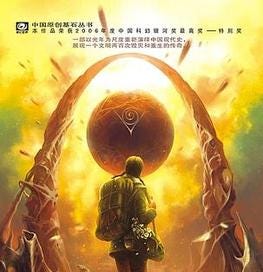Book Review: Remembrance of Earth's Past series
"Three Body Problem", Dark Forest", and "Death's End"
I have just finished the three books that make up the sci-fi series, “Rememberance of Earth’s Past”. Three Body Problem, Dark Forest and Death’s End.
I’m going to give a mini-review of the three books, but if I had to pick my favorite, in order they’d be Dark Forest, Three Body Problem and Death’s End.
The books were written by one of the most, if not the most perhaps, popular Chinese sci-fi authors there is, Liu Cixin. It’s translated from Chinese to English by Joel Martinsen.
I’d give the series a 4, perhaps a 4.5. So let’s start with the criticisms of the book.
I have a few criticisms, though in the whole scheme of things they are minor.
The female characters in the first two books mostly seem to be one dimensional and often are there only as romantic foils for the male characters. After a while I found the story of Luo Ji’s love interest incredibly hyper-romanticized and frankly, it got a bit annoying. Though, to be fair, it has some bearing on his character development. The third book in the series redeems this a bit with some major female characters.
Some of the disasters, which I won’t give spoilers for, seemed a bit far fetched, but more than the disaster itself, the recovery seemed so implausible and glossed over as to be a bit magical.
There were parts of the books which were difficult to wade through. The first 20-25% of the third book especially. I had a difficult time deciphering whether this because the writing was unclear, the translation was poor or, often likely, the cultural norms, expectations and assumptions of the Chinese author and the English-speaking readers was different. The translator does make footnotes of historical or cultural references that the Western audience might not understand, but I think it’s probably more difficult to translate the nuanced connotations of words and ideas. I believe the translator did a good job in general, but it is alway a bit difficult to capture it all well.
Ok, that’s out of the way, on to the praise. I loved the books. I read all three of them in a month’s time.
The story was engaging and plot was engaging and unique in many ways. It kept my interest and didn’t let go.
One of my favorite aspects of the series were the concepts. The title of the first book “Three Body Problem” speaks to one concept that I found fascinating to ponder. The idea of how life and civilization would evolve on a planet orbiting in a three star system. Newtonian physics can take the initial positions and velocities of two bodies (2 bodies orbiting each other) and predict their trajectories. Three bodies (in this case stars) on the other hand the trajectories are chaotic and difficult to predict. So, life evolving on a planet orbiting in such a system of three stars would have to contend with the very unpredictable periods (tens, hundreds, hundreds of thousands of years) alternating been habitability and extreme inhabitability. It is fascinating to read how the author contends with a civilization that evolves in such a system and their culture.
The second concept I found fascinating is related to the Fermi’s Paradox, the idea that considering there are an unimaginable number of possible planets that could harbor life and civilization, why haven’t we heard from any? There are two main strains of hypotheses as to why: We are alone and unique, we are not but for some reason it is interstellar communication is impossible or incredibly unlikely for various possible reasons. The author postulates a reason and you’ll find it in the second book “The Dark Forest”. The solution goes by that name but I won’t spoil it for you. Well, unless you’ve already come across it by the name of “Berserker hypothesis’ of which it’s similar, postulated by the sci-fi author David Brin. This Dark Forest hypothesis arises from two principle so “Cosmic Sociology” one of the main actors was taught by another 1) ‘Survival is the primary need of all civilisations’; and 2) ‘Civilisations continuously grow and expand, but the total matter in the universe remains constant’. From there… The dark forest. Read it and find out :).
There are also a lot of other ideas and theoretical science in the book that are interesting to think about from light speed travel, to lowering the speed of light, to stopping time (though I think there is an issue with that), neutrino based communication (though that has some experimental backing) and more. If you are a science geek, it’s a fun read, maybe even if you aren’t.
Definitely on my list of some of my favorite science fiction.



